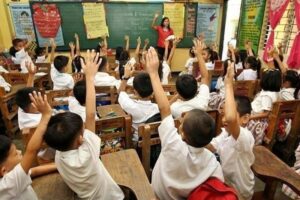
New DILG chief told to engage LGUs in fixing learning crisis
THE PHILIPPINE Business for Education (PBEd) asked the new Department of Interior and Local Government (DILG) secretary to mobilize local government units (LGUs) to address the learning crisis in the country.
“The education challenge we face is so immense that it requires a whole-of-nation approach. Local governments are in the best position to understand and address the specific issues their communities face,” PBEd Executive Director Justine B. Raagas said in a statement on Wednesday.
PBEd urged the newly appointed Interior Secretary Juanito Victor C. Remulla to use his experience in local governance to encourage local leaders in education and workforce development.
Mr. Remulla was the governor of Cavite prior to his appointment to the Cabinet of President Ferdinand R. Marcos, Jr. earlier this week. He replaced Benjamin “Benhur” de Castro Abalos, Jr., who is eyeing a Senate seat in the 2025 midterm elections.
“We need to ramp up local investments in education, put education at the heart of local development programs, upon which the growth and development of our community and entire nation rests,” Ms. Raagas added.
Filipino students were still among the world’s weakest in math, reading and science, according to the 2022 Program for International Student Assessment, with the Philippines ranking 77th out of 81 countries and performing worse than the global average in all categories.
Under the same report, the Organization for Economic Cooperation and Development said 15-year-old Filipino students also ranked 63rd out of 64 countries in terms of creative thinking.
PBEd stressed the importance of empowering local school boards (LSBs) and optimizing the use of special education funds, which are collected through a one percent tax on real property. These funds, as mandated by the Local Government Code of 1991, are used to address the supplementary needs of local public schools, PBEd said.
Pending measures in the Senate call for the expansion of the role of LSBs to include policymaking aimed at improving the quality of education, the group added.
In response to the widening skills gap driven by digitization and automation, PBEd, in collaboration with Citi Foundation, launched the JobsNext project.
This initiative has equipped over 2,500 Filipino youth with critical skills for future jobs in fields such as artificial intelligence, cybersecurity, and data management.
It also included the NEXTGENeration Leaders program, which further trained 52 participants to develop digital solutions addressing key community challenges like unemployment, healthcare access, and disaster response. Graduates of the JobsNext workshops presented project proposals in collaboration with local government mentors, with many securing commitments for seed funding to bring their initiatives to life.
“We are planting seeds of change through these youth leaders,” Ms. Raagas said.— Chloe Mari A. Hufana



